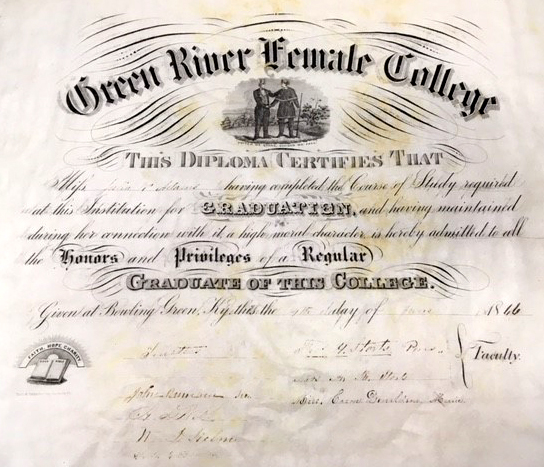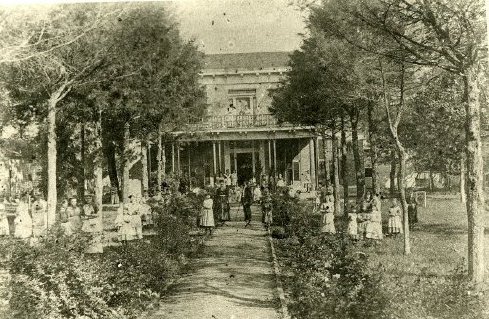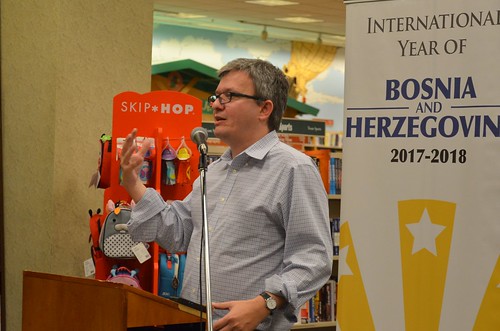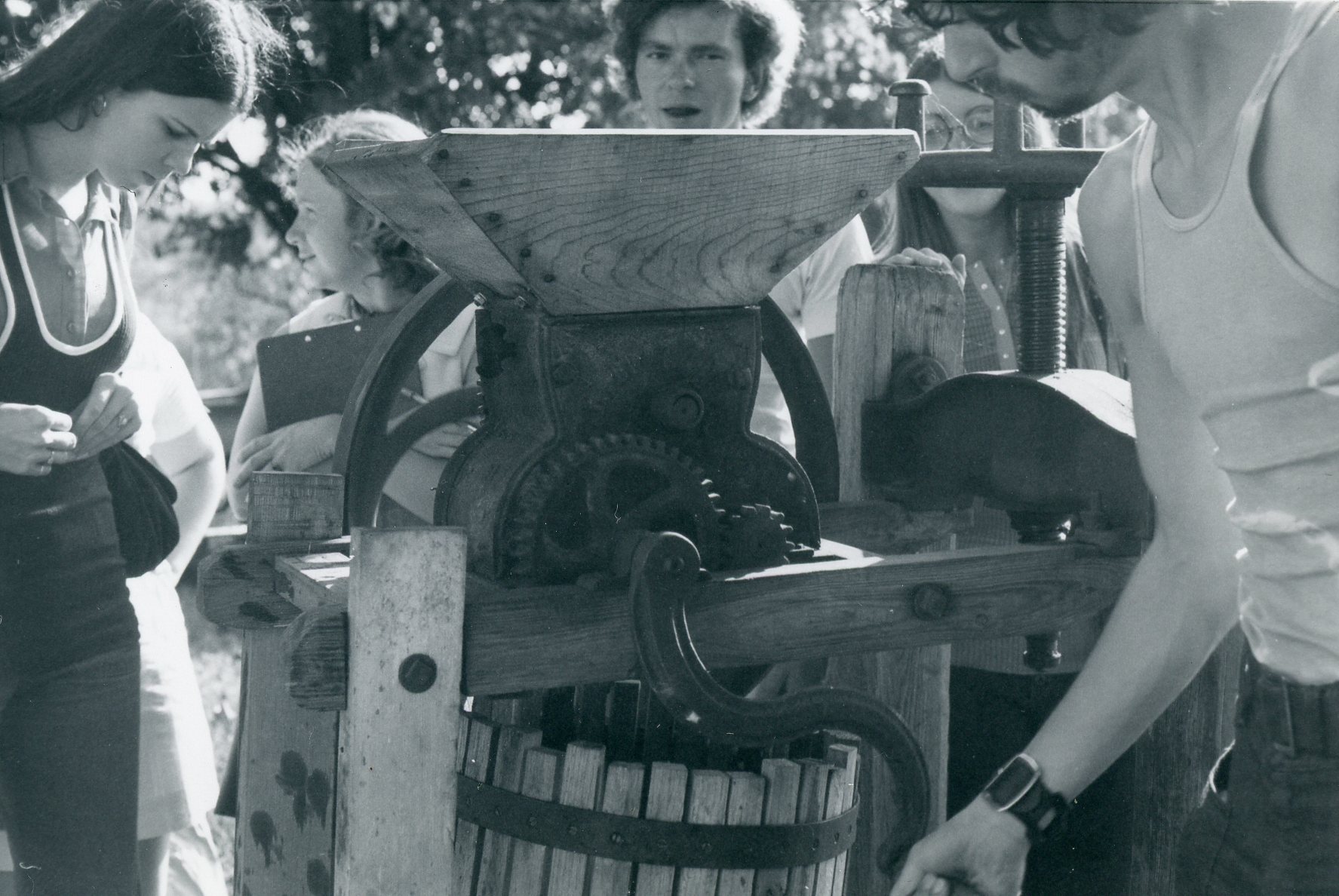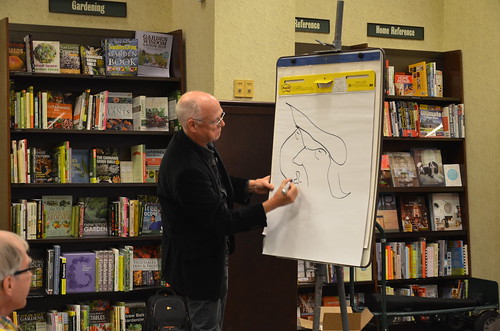Holly Tucker, a professor at Vanderbilt University, was the featured speaker at the WKU Libraries’ “Far Away Places” speaker series on the evening of Thursday, November 9, 2017, at Barnes & Noble Bookstore. She talked about and signed at the end of the talk her book City of Light, City of Poison–Murder, Magic, and the First Police Chief of Paris.
Monthly Archives: October 2017
Far Away Places presents Holly Tucker, author of ‘City of Light, City of Poison’
Comments Off on Far Away Places presents Holly Tucker, author of ‘City of Light, City of Poison’
Filed under Far Away Places, New Stuff, People, Stuff
Rapping With Spirits
During his long military career, Warren County, Kentucky native Richard Vance (1833-1902) indulged many extracurricular interests – French, ornithology, botany, literature, politics, religion, travel, and women. He also cast a curious, if doubtful, eye on spiritualism.
In March 1873, while stationed in New Orleans, Vance paid a visit to the “celebrated Spiritualist, Mr. Charles Foster,” who was offering seances featuring “rappings” and other manifestations said to emanate from the realm of the dead. Ushered into Foster’s room at the St. Charles Hotel, Vance found an amiable, somewhat heavy-set man of about thirty-five. Foster listened politely while Vance made clear that he believed neither in life after death nor in the power to summon those who had passed to the other side.
At Foster’s request, however, Vance wrote down on slips of paper the names of acquaintances who had died. Holding one of the slips, Foster then asked if the spirit of the person named thereon would communicate with Vance, and received in reply a “series of loud raps,” first from the table, floor and walls, then from “all parts of the house.” To Vance’s astonishment, Foster then proceeded to relate details about three deceased individuals from his past—a servant, Tony, killed by a gunshot; Rachel, an elderly female servant of his grandmother’s; and an old friend, Gus Montague.
At a loss to explain Foster’s revelations, Vance insisted to himself that this spiritualist must have had the power to read his thoughts. Writing of the encounter in his diary, he reviewed his religious evolution—from “firm believer” to skeptic to a refusenik on the subject of immortality. That “was where I was this morning,” he admitted, but where “I will drift after what I have seen to day remains to be seen.”
Richard Vance’s diary recording his spiritual experience is part of the Manuscripts & Folklife Archives collections of WKU’s Department of Library Special Collections . Click here for a finding aid. During this Halloween month, search TopSCHOLAR and KenCat for other collections relating to spiritualism, ghosts and views about death.
Comments Off on Rapping With Spirits
Filed under Manuscripts & Folklife Archives
Education in the Archives
For October’s Kentucky Archives Month and its theme of “education,” the Manuscripts & Folklife Archives section of WKU’s Department of Library Special Collections can boast of many collections documenting the work of teachers and schools in Kentucky. We hold materials relating to WKU faculty such as Marjorie Clagett, Nelle Travelstead and Arndt Stickles, as well as distinguished educational administrators (and WKU alumni) like Chester Travelstead. The classroom labors of many other teachers such as Erleen Joiner Rogers, Mary Woodrow Smith, Frances Hart and Dudley Whitmer are also represented in our collection.
We have previously blogged about several early schools in our area: Cedar Bluff College, Franklin Female College, Smiths Grove College and St. Columba Academy. A recent acquisition is an 1866 diploma from the Green River Female College of Bowling Green. The diploma certifies Julia Woodburn Adams as a “Regular Graduate of the College,” having completed its course of study and “maintained during her connection with it a high moral character.”
Green River Female College was the child of Baptist minister Thomas H. Storts. He initially held classes in a church basement, but after the Civil War he moved the school to a large house at 1253 State Street, where he and his small staff of teachers accepted both day and boarding students. Unfortunately, Storts struggled financially and lost the school in 1877, only a year after receiving a formal charter of incorporation. Then as now, education could be a costly endeavor for all involved. Storts’s struggle to collect tuition (and the creativity of methods used to pay) was evident in the forbearance he gave the family of Lida, Mary, and Maggie Calvert, sisters who attended early in the 1870s. Two years after they first enrolled, Storts had credited against his $308 account only $10 in cash and $28 worth of goods consisting of two counterpanes, two blankets and a set of silver spoons. Before marrying and embarking on a career as a successful author, Lida Calvert went to work for Storts as a teacher in order to retire her younger sisters’ indebtedness.
Click on the links to access finding aids for these collections. For more on schools, teachers and teaching, search TopSCHOLAR and KenCat.
Comments Off on Education in the Archives
Filed under Manuscripts & Folklife Archives
Far Away Places presents Fedja Buric, “Bosnia: More Than Twenty Years Since Dayton”
With support from an IYO grant, WKU Libraries invited Bellarmine Historian Fedja Buric to be our guest speaker at Barnes & Noble Bookstore on the evening of Thursday, October 26, 2017, to talk about the history and the current situation in Bosnia.
Comments Off on Far Away Places presents Fedja Buric, “Bosnia: More Than Twenty Years Since Dayton”
Filed under Events, Far Away Places, General, Latest News, People
A Portrait is Worth a Thousand Words
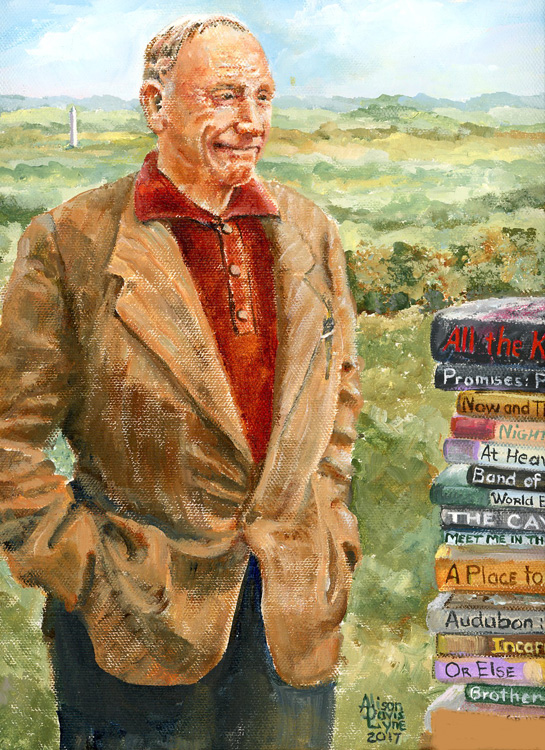
Alison Davis Lyne’s portrait of Robert Penn Warren will be housed in the Kentucky Building’s RPW Library.
The Department of Library Special Collections recently acquired a portrait of Kentucky literary giant Robert Penn Warren. Painted by freelance illustrator Alison Davis Lyne of Adairville, Kentucky, the portrait will be housed in the Robert Penn Warren Library. Lyne was approached by Historic Todd County, Inc. about painting several well known figures from Todd County for inclusion in a book titled T is for Todd County. Besides Warren, Lyne painted Dorothy Dix, an early 20th century advice columnist, and Natachee Momaday, a 20th century Native American author. After volunteering to paint Warren, Lyne contacted WKU’s Library Special Collections about obtaining a photograph of Warren in a relaxed pose. With several thousand photographs to choose from in the Warren Collection, the curator chose one that met her parameters. In the color photo, Warren wears a tan sports jacket with a rust colored polo shirt. He stands at ease, with his hands in his pockets and with a slight grin on his face. As Lyne said upon seeing it: “This photo would be just perfect!” In the portrait, Warren stands tall in the foreground juxtaposed against the undulating Todd County landscape with a red tailed hawk gliding overhead. Warren was always known as Red to his closest associates. In one corner of the portrait, the artist has created an obelisk of sorts from Warren’s books. Warren published over fifty books ranging from poetry to textbooks and remains the only author to win Pulitzer Prizes for both poetry and fiction.
The Robert Penn Warren Library in the Department of Library Special Collections houses Mr. and Mrs. Warren’s private libraries which they maintained at their Fairfield, Connecticut home. It includes over 2,000 volumes of classical and modern Western literature and history. It also houses the collections of Mr. Warren’s biographer Joseph Blotner and his bibliographer James Grimshaw. The library also boasts several thousand Warren family photographs, which are cataloged and can be found in KenCat. All the books in the library are cataloged and can be found in the library’s online catalog. The Manuscripts & Folklife Archives houses several Warren-related collections. Search TopSCHOLAR for those entries.
Alison Davis Lyne is best know as a children’s book illustrator. To see more of her work, go to Lyneart. Her husband, Frank, is a sculptor.
Comments Off on A Portrait is Worth a Thousand Words
Filed under Acquisitions
Archives Month 2017 – Education
Archives Month is a time to focus on the importance of records of enduring value. This year the theme is Education. With the help of the Kentucky Museum, Library Special Collections has created an exhibit in the Western Room of the Kentucky Building. This exhibit highlights items used by students in classrooms and shows some documents created by school administrators and students.
There is an online exhibit component as well where we highlight photographs and documents regarding all sorts of educational endeavors in Kentucky.
Lastly, we will be asking a question a week about your educational experiences. Question 1: Who was your favorite teacher? Take a look at some of the answers we’ve collected.
Comments Off on Archives Month 2017 – Education
Filed under University Archives
From Juice to Jug: Cider Making in Western Kentucky
In the summer of 1970, Western Kentucky University folk studies student Karen Stewart set out to explore the cider making process at a small home in the even smaller river town of Woodbury, Kentucky. The cider press owners, Randall and Daisy Lytle, were certainly no strangers to the nuances of traditional cider making and shared with Stewart their history of owning a press and working the apples from juice to jug.
Snaking its way through thick forests and sprawling pastures, the Green River skirts the edges of small towns throughout south-central Kentucky. It was on these muddy banks where Lytle, at the time a young boy, received his first cider press from a ninety-year-old riverboat captain. Lytle restored the barely-functioning press to its former glory and began selling homemade cider for fifty-cents a gallon. Several years later, after returning home from serving in World War II, Lytle discovered his press had been sold as scrap iron for twenty cents. It would be another quarter of a century before Lytle found his second press, but the cider was worth the wait.
Enlisting the help of an orchard owner in Logansport, Kentucky, Lytle, along with his wife Daisy, began the intensive process of cider making. Adhering to the motto of “no apple left behind,” the Lytles gathered as many apples as possible, including those with worms, which, according to Daisy, were “just protein, anyway.” After sorting and washing, Lytle placed the apples into a large hopper on the top of the press. With a large crank to one side, the hopper served as a makeshift food processor reducing the apples to a thick pulp, which was collected in a barrel made of wooden slats. Lytle transferred the product to another barrel where a large wooden disc was lowered onto the pulp, squeezing out the juice between the slats. Afterwards, the juice was strained through a cloth into a glass jug, and any remaining pulp was fed to farm animals. Standing in the bottle for several days, the juice would begin the fermentation process, eventually resulting in the crisp, tangy flavor of a well-made cider.
With interest in southern foodways, self-sustainability, and cultivating intentional community at an all-time high, there is comfort in knowing that the Lytles served a vital role in carrying on the legacy of traditional craft brewing.
To access Stewart’s paper online, click here for a digital copy of the finding aid.
For more information relating to Kentucky folk studies, projects, and collections, visit WKU’s Manuscripts and Folklife Archives!
Post written by WKU Folk Studies graduate student Delainey Bowers
Comments Off on From Juice to Jug: Cider Making in Western Kentucky
Filed under Manuscripts & Folklife Archives
Kentucky Live! presents Joel Pett, Pulitzer Prize-winning editorial cartoonist
Pulitzer Prize-winning editorial cartoonist Joel Pett spoke in this year’s WKU Libraries’ “Kentucky Live” speaker series on the evening of Thursday, October 19, 2017. at Barnes & Noble Bookstore, a partner with WKU Libraries for community outreach services.
Comments Off on Kentucky Live! presents Joel Pett, Pulitzer Prize-winning editorial cartoonist
Filed under Events, General, Kentucky Live, Latest News, People



